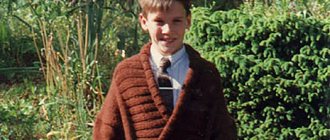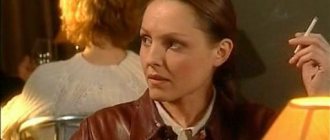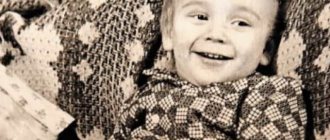Brief biography of Rina Zelenaya: the beginning of her life's journey
The heroine of this story has come a long way in life, almost 90 years long. She was born in 1901, at a time when Russia was ruled by a tsar. It survived the revolution, the overthrow of the monarchy, the formation of Soviet power, the birth and rise of the USSR, the Great Patriotic War, years of repression, Khrushchev's thaw and Gorbachev's perestroika.
All this time, many events were happening in her life: she studied, worked, fell in love. How to put a story about such a busy life into one small article? Let's try to briefly introduce the reader to the biography of Rina Zelenaya.
So, the future star was born in 1901 on November 7, in Tashkent. She was the third child of her parents. Mother's name was Nadezhda Fedorovna, father's name was Vasily Ivanovich. The newborn girl was named Katya. Yes, the actress’s real name does not sound at all like what we are used to. Her full name is Ekaterina Vasilievna Zelenaya.
In Tashkent, Katya Zelenaya entered a secondary school, but she did not study there for long, since the family moved to Moscow, and her father sent his beloved daughter to a girls’ gymnasium for girls from wealthy families.
In 1918, Vasily Ivanovich was assigned to Odessa and first went there alone, without his family. When the wife, along with Katya and her sister, came to her husband, it turned out that he already had another woman. Katerina decided to look for a job to start earning money and help her mother settle in a new place.
By chance, the girl saw a leaflet on the wall of the house with an announcement about the recruitment of young people to a theater school and decided to go to the specified address. Presented before the admissions committee, she began to read a dramatic poem.
She tried her best to convey the tragedy of the poems with her voice and facial expressions, but the more she tried, the louder the theater teachers laughed. Katya was accepted unanimously. How could you miss out on a girl with such incredible comedic talent!
A few years later, Katya graduated from the Moscow Theater School. The girl had a long creative path ahead of her.
Login to the site
Source
She created a separate genre on the stage - “adults about children”, acted a lot in films, voiced cartoons, wrote scripts and books.
This unique actress is remembered and loved for her roles as Tortila the turtle in “The Adventures of Pinocchio”, Mrs. Hudson in “Sherlock Holmes” and a huge number of episodic but memorable roles.
For a long life - almost 90 years! – Rina Zelenaya did not get a single major film role. But as soon as she appeared on the screen even in the slightest episode, the viewer paid all the attention only to her...
Rina Zelenaya was born in 1901 in the city of Tashkent - according to some sources, into a noble family, according to others - into the family of a modest official. However, one could not exclude the other.
Although it is clear that in Soviet times, both the noble origin and the grandfather’s involvement in the Moscow Duma (and the family at some stage moved from Tashkent to the capital) did not have to be particularly advertised.
Katya was a mischievous and rebellious child. She was fond of reading romance novels, climbing trees, and when the First World War began, she and her classmates declared a boycott: she refused to learn German.
Having matured a little, Zelenaya managed to enter the Moscow Theater School at the Free Theater, and she made the admissions committee laugh out loud by reading Nikitin’s poem “The Coachman’s Departure.” To her first viewers, she and her fellow students appeared almost at the front (the civil war was already underway). And not just anywhere, but near Tsaritsyn (now Volgograd).
On the stage, Rina Zelenaya did not immediately find the mask of a child who was absolutely in demand, chattering in childish language about adult affairs, exposing their absurd essence. But in films, almost from the very beginning (and with constant success), she began to portray all kinds of fools - of different calibers and origins.
Clever and mocking, she left on film something like a catalog of charming idiots, striking with the variety of colors and plumage of this subspecies of the Soviet fauna. Rina made her debut with the tiny role of a lively marukha, who, it seems, had just recently come from the village to catch the bird of happiness, but ended up in a thief's raspberry. We are talking about an episode in the famous “Start in Life” , where Zelenaya - as if in a rustic headscarf, but with her lips painted in a “bow” - sings a thief’s silly little ditties of her own (that is, this very heroine’s) composition: “There is ink on the table , in that ink there are two feathers. Goodbye dad, goodbye mom, I’ll go to the Caucasus.” Moreover, it is absolutely clear that some pimp-thief like Zharov’s Zhigan promised to take her to the Caucasus.
But in “The Shining Path,” the actress presented to the public a person from a different social class: the director’s burry, arrogant secretary—a lady, undoubtedly, “from the former.” This fragment of the empire, in accordance with the demands of the time, was presented in a satirical vein: the arrogant slacker Zelenoy bullied the Stakhanovite heroine Lyubov Orlova, but abruptly switched to an obsequious “you”, as soon as the record holder was telegraphed the highest blessing of the best friend of all textile workers. (Key phrase: “Moguzova, for some reason you need telegogamma...”)
It is very characteristic that the heroines of Rina Zelenaya are remembered along with the laconic text, which later became a proverb. The actress most often composed these lines herself, turning ordinary episodes into small masterpieces.
Who doesn’t remember, for example, the stupid housekeeper from the film “The Foundling” ? This Arisha is an impudent chatterbox with a Little Russian accent (her machine-gun tongue twister rings in my ears with the invariable refrain: “I have a day off today!”).
By the way, the script for “The Foundling,” written by Zelena herself together with the famous children’s poet and writer Agnia Barto, was, to the amazement of both debutantes, accepted without corrections. So it is to this sweet couple, Barto and Zelenaya, that Faina Ranevskaya owes the curse of her entire life - the tease “Mulya, don’t irritate me!”, which hooligan children invariably shouted after the artist. By the way, Zelenaya and Ranevskaya became friends in this picture.
War
The Second World War found the Theater of Miniatures, where Rina Zelenaya worked, on tour. The Ministry of Culture decided not to evacuate the troupe, but to extend the tour indefinitely. When they finally ended, the artists were not taken to Moscow, but were left in Kuibyshev, where almost the entire theatrical bohemia gathered. Revolution Day was also celebrated there, coinciding with Rina Zelenaya’s birthday—November 7. And in the fall of 1945, she visited Berlin and even signed on the Reichstag: “I managed to squeeze in between the names of an infantryman and a sailor on one of the columns.” Rina Zelenaya spent most of the war years at the front .
It must be said that in adulthood, as in childhood, Rina Zelenaya never tired of loving life, responding to human problems and certainly sticking her cute upturned nose wherever something important happened. Be it the North Pole, where she was invited to fly on an honorable business trip to perform for winter workers, and where, together with a group of fellow artists, she almost broke her neck when the engine iced up and the plane’s propellers jammed. Be it the front of the Great Patriotic War, where she asked herself to go - on trips with acting crews.
Later, her biography included various stage performances, work on the radio, voicing a lot of the main cartoon characters, led by the lazy Vovka from the ageless “Vovka in the Far Far Away Kingdom.” But in feature films, in accordance with the grotesque comic role, this wonderful actress had only cameos. But what kind!
As for her private life, Rina Zelenaya was married twice: first (very briefly) to lawyer Vladimir Blumenfeld, and then to Konstantin Topuridze, a famous architect , whose gilded multi-figure fountain “Friendship of Peoples” still adorns the space of the former VDNH.
She never had children, and perhaps that is why she so willingly communicated with the kids, adopted their pearls, many of which she included in her pop and radio performances. Due to the lack of offspring, she concentrated all her emotions on her husband and suffered terribly when he died.
Until the end of her life, Rina Zelenaya was an inquisitive, funny creature, open to life. But this is in normal situations. In critical cases, they are also restrained, not flaunting their sores and problems. Until she was very old, she lived quite prosperously in everyday life, but at the same time she did not become hardened and, they say, never refused to help those who were less fortunate than her.
Back in the 60s, she herself underwent a difficult operation, which almost no one knew about, but thanks to her own love of life she lived for many years after that. And eight years before her death, she fell into a nine-day coma, so it seemed that she would never get out. But it was not to be: the actress still managed to appear in the last episodes of “The Adventures of Sherlock Holmes and Doctor Watson” - she pleased the grateful audience with another “tortilla tortilla”, this time of British origin.
Despite her insignificant screen presence, her Mrs. Hudson from Maslennikova’s series seems to be almost the heroine of the foreground. God knows how, but here Zelenaya managed to indicate both character and destiny. (And this despite the fact that, bearing in mind the paucity of dramatic material, she herself made fun of this respectable housewife, noting that it was amusing to play furniture for the first time in her life.)
At the end of the 80s, Rina Zelenaya lived mostly in the House of Cinema Veterans, in Matveevsky. Occasionally I went to some creative meetings, radio recordings or dubbing of cartoons. I could see almost nothing due to astigmatism, and had difficulty moving after a hip fracture. Every morning I did “lying” gymnastics. And at the Veterans Home she was not friends with anyone, although she knew everyone. Old age annoyed her.
“God punished me with longevity,” the actress often repeated. But her sense of humor did not fail her. One day, while walking, Rina Zelenaya stumbled and fell into the bushes next to the path. I couldn’t get up on my own and began to wait for someone to pass by. And then she said: “Pay attention! Rina Zelenaya is lying here! She fell!"
She herself did not know exactly her age. Therefore, when filling out the next form, she made up her year of birth anew. All reference books indicate that the actress was born on November 7, 1902, and friends are sure that this significant event could have happened in 1896 or 1900. But relatives of Rina Zelenaya claim that she was born in 1901. This date is also listed on the monument to the actress at the Vvedensky cemetery. On April 1, 1991, Rina Zelenaya was going to be awarded the title of People's Artist of the USSR. On this day, the great actress died. Having learned about this news, the government did not release the documents...
The beginning of an acting career
In 1921, Zelenaya began playing in the Odessa KROT theater, located in an old basement. It happened that in just one evening she had to play five roles. On stage she was versatile: she sang, danced, and delivered monologues.
The girl’s performances were always accompanied by resounding success. Soon she decides to move to Moscow, having learned about the opening of new theaters there. Arriving in the big city, Rina Zelenaya quickly realized that no one was waiting for her here. For some time she could not find a job and was in a depressed state of mind.
One day she caught her eye on the theater’s catchy sign, “Don’t Cry!” It turned out that it was not a theater, but a night cabaret, and a very popular and expensive one. The capital's bohemia gathered there at night: musicians, artists, actors and writers. The entertainment establishment's repertoire was based on funny parodies, comic couplets, and romances.
This time, actress Rina Zelenaya was lucky - she was accepted into “Don’t Cry!” There she began to perform songs specially composed for the cabaret by composers Matvey Blanter and Yuri Milyutin based on poems by poets Vera Inber and Nikolai Erdman.
Rina's restless nature did not allow her to stay in one place for long. The actress goes to Petrograd and gets a job there at the “Balaganchik” theater, then at “The Bat”. And yet she returned to Moscow. At this time, the Moscow Theater of Satire was created there, where the actress was gladly taken. After all, her talent perfectly matched the creative direction of the newly created theater.
When she first appeared on the big stage, the audience did not even notice this fragile, unremarkable girl. But as soon as she began to speak the words from the role, all the attention of the audience instantly switched to her. Moscow viewers fell in love with the bright actress. In the article there is a photo of Rina Zelenaya in her youth.
Variety artist
Once the actress was supposed to perform at a concert in a club, but her accompanist never showed up. The administrator, in desperation, asked Rina Zelenaya to come up with something to keep the bored audience occupied.
The actress went on stage and began to read “Moidodyr” by Chukovsky in a child’s voice. The audience liked it so much that they asked again and again to repeat the improvised number. So the actress discovered a new role and began performing regularly on stage.
At this time, such popular children's poets as Agnia Barto, Samuil Marshak, Sergei Mikhalkov specially wrote poems for Rina Zelenaya. The actress wrote some of the texts for her pop numbers herself. She often appeared on the radio, and children sent her letters.
Film work
Of course, cinema could not ignore such an interesting creative personality as Rina Zelenaya. In 1931, the actress first tried herself in cinema, playing the role of a singer from Zhigan’s gang of thieves. The film included a very small episode with the participation of the actress, but that was just the beginning! From now on, films with Rina Zelena will delight viewers constantly.
In 1935, she starred in an episode in the film “Love and Hate.” In 1939, Zelenaya, together with Agnia Barto, wrote the script for the film comedy “The Foundling” and played the funny role of the housekeeper Arisha in it.
The actress loves cinema and the filming process, so she agrees to the most minor roles without hesitation. But she plays in such a way that the audience’s attention is always focused on her character. And this always happens, no matter what film she appears in.
Here are some of Zelenaya’s most memorable film roles:
- make-up artist (“Spring”)
- secretary (“Shining Path”);
- old lady Nadya (“The Tale of Lost Time”);
- restaurant singer (“Give me a book of complaints”);
- Aunt Ganymede (“Three Fat Men”);
- Elizaveta Timofeevna (“Girl without an address”);
- grandmother (“About Little Red Riding Hood”).
But there were 2 more roles that became especially important in the actress’s work. For them, many called Rina the “queen of the episode.”
Cinema occupied an important place in life
Rina Zelenaya first appeared on the big screen in 1931, when she received a small role in the film “A Start to Life.” The film “Foundling,” which premiered in 1939, brought the girl wide fame. Rina not only superbly performed one of the roles in this film, but also wrote the script for the film.
Rina Vasilyevna was a unique actress, because she never refused even the smallest role and could make the film more interesting and popular with just her appearance on the screen. In addition, Zelenaya was not afraid to improvise and improve her image right during the filming process. Such famous phrases as “They don’t wear lips like that nowadays!” and “I won’t leave this place until I die!” But I won’t die soon!” the artist just came up with them on the fly, but the audience immediately remembered them and became popular.
Green could often be seen in children's fairy tales. There she demonstrated not only her acting skills, but also her vocal abilities. Rina appeared in such films for children as “The Adventures of Buratino”, “Little Red Riding Hood”, “Cipollino”.
Even though she was already quite old, Rina Vasilyevna did not stop acting. She played in all five parts of the feature film “The Adventures of Sherlock Holmes and Doctor Watson,” and at that time she was already over 80 years old.
Star roles of Rina Zelenaya
In 1975, on TV during the New Year holidays, Soviet schoolchildren were shown a new film, “The Adventures of Pinocchio.” The success was deafening. Moreover, adults liked the film no less than children. A small role of the turtle Tortilla was played by Rina Zelenaya.
And how organically she played this role! Since then, many began to call the artist nothing more than “tortilla tortilla,” which could not but irritate the star, but popularity has its own laws that cannot be resisted.
It was difficult to foresee that fate would soon give the actress another star role. However, a few years later, the actress was offered to play Mrs. Hudson in the serial film “Sherlock Holmes and Doctor Watson.” Of course, she gave her consent. The success of the image of the old English lady - the famous detective's landlady - surpassed even the popularity of the unforgettable Tortilla.
The first episode of Sherlock Holmes was released on television in 1979, the last in 1986. We enjoy watching this film even now. We invite you to look at the photo of the unforgettable Mrs. Hudson performed by Rina Zelenaya.
“Now I was already a turtle...”
Rina Zelenaya wrote the script for “The Foundling” together with Agnia Barto , and invented for herself the tiny role of housekeeper Arisha (literally in a few scenes, maybe that’s why she played it). And I made up the story about the old woman who came in to drink water on the spot. “Just like that, in apartment 57, an old lady came in alone too. She asked for a drink of water. I drank some water. Then they realized there was no piano!” — she chattered in the frame.
"Foundling" (1939). Still from the film... Grigory Alexandrov , having once met Zelenaya, began to complain:
- Rina! Darling! What a pity that all the roles in my new film have already been taken!
- Is it really all of them?
“That’s absolutely it...” the director tried to justify himself. - However, no, there is one role left. But for men: everyone refuses the role of make-up artist.
- Wonderful! Give me this role!
Rina Vasilyevna made the make-up artist a make-up artist and was remembered by the viewer for one, but exclusively “bright green” phrase: “Darling, people don’t wear lips like that anymore!”
Then there was “Meeting on the Elbe” and the role of a clean woman in the commandant’s office: “I have a large shell under my bed. I didn't put it there. He doesn't bother me at all, no, no. But it's very dirty. Tell me, can I wash it with soap?”
"Girl with no address" (1957). A still from the film Later - “Girl Without an Address”, where Zelenaya got the role of Elizaveta Timofeevna, a member of the artistic council of the experimental studio. Remember? “A Soviet girl should boldly wear what we are introducing!”; “We must implement, not fantasize”; “Do you want to become a ripper?”; “Ivanova, why are you speaking out, you’re not a member of the artistic council?!”
Well, after the film “The Adventures of Pinocchio,” beloved by many generations of children, in which she played the turtle Tortilla, Rina Vasilyevna admitted: “Now I was already a turtle. I see that we can’t wait for a human role, so I agreed.”
However, with such a name and surname, it was as if she was destined to be weird, to be funny. In her youth she was sweet and pretty, but at an advanced age, Green began to look like her last name: something frivolous seemed to appear in her face. And her voice has always been unique... Well, who else could voice cartoon characters like that?!
Personal life of the “episode queen”
Our heroine married very early - at the age of 18, to lawyer Vladimir Blumenfeld. The first husband was much older than Rina, perhaps because of this, Rina Zelenaya’s married life soon fell apart. But after the divorce, the former spouses maintained friendly relations throughout their lives.
Rina Zelenaya's second husband was the architect Konstantin Topuridze. The actress lived with him for more than 40 years. The couple did not have children together, but Rina adored her husband’s two sons from her first marriage and her nephews. In the photo you can see what the happy married couple looked like.
Interesting Facts
Despite the fact that Rina Zelenaya’s personal life can be called happy, she was never a good housewife and did not know how to cook, sew, or clean at all. The housekeeper did all this.
When the actress performed on-site concerts at the front during the Great Patriotic War, she could not even sew on buttons that had come off her coat. The boys helped the actress solve this impossible task.
Rina didn’t know how to save money, didn’t put anything aside for a “rainy day” and was always surprised how her acting colleagues had the funds to buy expensive antiques or fashionable things.
She loved sports very much. In her youth she was actively involved in rowing and played billiards all her life until old age. Yes, such was the tireless Rina Zelenaya.
The actress’s personal biography is approaching a sad ending.
Rina Zelenaya and her roles in films
Dear readers, I will present you with short videos with the most striking moments of her roles. Enjoy them.
The role of Vovka was voiced by Rina Zelenaya
Rina Vasilievna, who had been waiting all her life for star roles in films, never got them. She said:
What’s surprising is that everyone said: “Rina! Rina!”, and they filmed other actresses. Probably, then it was necessary to marry some film director.
The actress always took awards lightly and often said that if she was awarded, it would be 40 minutes before her death. And so it happened. On April 1, 1991, the President of Russia signed a Decree awarding the actress the title of People's Artist of the USSR, but she died a few hours later. She had cancer. But the documents conferring her title were never released.
Last years of life and death
In the late eighties, Rina Zelenaya began to live in the House of Cinema Veterans. She had poor vision and had difficulty moving due to the injury. But despite feeling unwell, the aged actress still began every day with “lying down” morning exercises.
At the Veterans' Home, Zelenaya didn't really communicate with anyone; old age irritated her. However, her sense of humor never left her. One day, while walking, the actress fell. It was not possible to stand up on her own, and she was not visible behind the bushes. To attract attention, she said loudly: “Pay attention! Rina Zelenaya is lying here! She fell!".
The people's favorite died on April 1, 1991. She was buried at the Vvedenskoye Cemetery in Moscow, next to her husband, Konstantin Topuridze.
Biography
The sources contain different dates of birth of the actress[4]; everyone only agrees that she was born in Tashkent. She studied at a real school, when her father, Vasily Ivanovich Zeleny, was transferred for service from Tashkent to Moscow, she entered the von Derviz gymnasium in Gorokhovsky Lane.
In 1919 she graduated from the Moscow Theater School[5]. Her teachers were Illarion Pevtsov, Nikolai Radin, Maria Blumenthal-Tamarina[6].
At the same time, she married lawyer Vladimir Blumenfeld, but they soon separated due to the dissimilarity of characters. The actress's second husband was the architect Konstantin "Kote" Topuridze (1905-1977). There were no children.
She started on the stage as a professional singer, but then devoted herself entirely to her theatrical career. She worked in the theaters (since 1921) “Balaganchik” (Petrograd), “Mole” (Odessa)[7], cabaret “Don’t cry”[8].
The actress played eccentric roles in parody plays, performed monologues in verse, ditties, songs written to the music of M. Blanter, S. Katz, Y. Milyutin. Already in 1923, the public specially came to the actress’s number, which gave the entertainer S. Timoshenko (“Balaganchik”) a reason to introduce her like this: “This is a modern actress, an actress of today, a speech actress, a storyteller, a mime artist, a dancer, a dancer, a singer—everything.” doing this with an ironically sly smile, a sparkle in her eyes and an instant reaction to her surroundings”[8].
In 1924 she became an actress at the Moscow Satire Theater. Since 1928, she joined the troupe of the Review Theater at the House of Press. She worked in the Moscow and Leningrad music halls (1929-1931), the Moscow Theater of Miniatures (1938-1941)[8]. In the 1930s, she performed on stage with stories about children and worked on the radio. Her repertoire includes poems by Vladimir Mayakovsky, Agnia Barto, Samuil Marshak, Sergei Mikhalkov[6].
In 1929, she was forced to fill a gap that arose in the concert due to unforeseen circumstances. And the actress read “Moidodyr” by K. Chukovsky in the voice of a child. The success was deafening. This is how the famous genre “For adults about children” or “About little ones for big ones” arose, which has become the main genre for her concert stage since the 1940s. In the image of a kind, cheerful girl, she performed monologues and sang children's songs (“Silver Fox”, “Pochemuchka”, “Feathers from the Bird”). The organic performance of the role was so great that the radio broadcast letters from little listeners to the actress[8].
The actress’s unique personality, formed through a natural penchant for parody, eccentricity, and improvisation, allowed her to create a number of bright satirical roles and numbers. In the parody number “Charlestuska,” the actress, performing ditties in a Russian sundress, suddenly threw it off and remained in a caricatured costume (swimsuit, but tightly buttoned at the collar of the blouse, the head of a silver rooster on her panties and a lush bouquet of ostrich feathers on the side, like a rooster’s tail), crossed to the Charleston and in its rhythm continued to perform ditties. In the miniature “Intermission Without Intermission” (1938) there is a satirical image of a snappy, impudent barmaid - the actress wrote this role herself. In the miniature by L. Lench “One Minute” (1940) of a dentist engaged in social work[8].
During the Great Patriotic War, she took part in performances of front-line artistic brigades, for which she was awarded the Order of the Red Star in 1944. The award sheet for the order states:
While on the 4th Ukrainian Front, Comrade Zelyonaya, together with combat units, passed through the Carpathians. In moments of respite between battles in a dugout, a destroyed barn or a clearing, she performed in 83 concerts for privates, officers and generals[9].
She acted in films (“Foundling”, “Spring”, “Shining Path”, “The Adventures of Pinocchio”, in the series about Sherlock Holmes), wrote scripts and stories in collaboration with A. Barto (“Motley Stories”, 1958).
In 1981, she wrote an autobiographical book, “Scattered Pages,” addressed to a wide range of readers. The book includes a description of the creative world in which the actress lived, with whom fate brought her together and how this affected her as a creative person. The book included such personalities as Arkady Raikin, Sergei Mikhalkov, Lyubov Orlova, Korney Chukovsky and many others[10].
With her unique, memorable voice, she voiced many cartoons.[11]
The actress has always taken her awards very seriously. “If I am awarded, it will certainly be 40 minutes before my death,” she laughed. And so it happened. On April 1, 1991, M. Gorbachev, already being the President of the USSR, issued a decree awarding Rina Zelenaya the title of People's Artist of the USSR, but on the same day, a few hours later, she died from a malignant tumor. These documents were not allowed to proceed [ source not specified 377 days
].
She lived in Moscow in the former apartment building of the First Russian Insurance Company (Kuznetsky Most, 21/5 - Bolshaya Lubyanka, 5/21). She spent the last years of her life in the House of Cinema Veterans in Matveevsky.
She was buried in Moscow, at the Vvedenskoye Cemetery, next to her husband, architect Konstantin Topuridze (3rd grade).
Filmography of the actress
List of films in which Rina Zelenaya played:
- “A start to life”;
- "Foundling";
- "Love and hate";
- "Old Yard";
- "Shining Path";
- "Composer Glinka";
- "Spring"
- "Poet";
- "Hypnosis session";
- "Precious Gift";
- "Merry Stars";
- "Girl without an address";
- "Quite seriously";
- "Seven Nannies";
- “Groom from the Other World”;
- "Key";
- "Cain XVIII";
- "Cheryomushki";
- "Bicycle Tamers";
- "The Tale of Lost Time";
- “Give me a book of complaints”;
- "Everything is for you";
- “Operation Y and other adventures of Shurik”;
- "Three Fat Men";
- "Foreigner";
- "In city C";
- "New Year's kidnapping";
- "The Adventures of the Yellow Suitcase";
- “Attention, turtle!”;
- “How we looked for Tishka”;
- "12 chairs";
- “Hello, Warsaw!”;
- "Telegram";
- "Fire";
- "Nylon 100%";
- "The Starling and the Lyre";
- "The Adventures of Pinocchio";
- “One hundred grams for courage”;
- "Eleven Hopes";
- "About Little Red Riding Hood";
- Series "Sherlock Holmes and Doctor Watson";
- "Citizens of the Universe";
- "Valentin and Valentina."
The actress also worked a lot in the field of dubbing cartoons. Her voice can be heard in the following animated films:
- “Who said “meow”?”;
- "Capricious cat";
- "Firefly No. 4. Our pencil";
- "Rooster and Paints";
- "Mouse and Pencil";
- “Little Frog is looking for daddy”;
- “Vovka in the Far Far Away Kingdom”;
- “About the evil stepmother”;
- "The Capricious Princess";
- "Beavers follow the trail";
- "The Canterville Ghost";
- "Treasured Dream";
- "The Wizard of Oz";
- “How a goat held the Earth”;
- “Dunno in the Sunny City”;
- "Alice in Wonderland";
- “Mother for a baby mammoth”;
- "Mrs. Vinegar and Mr. Vinegar."











